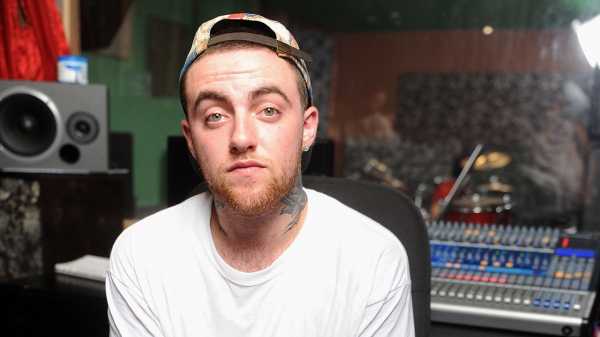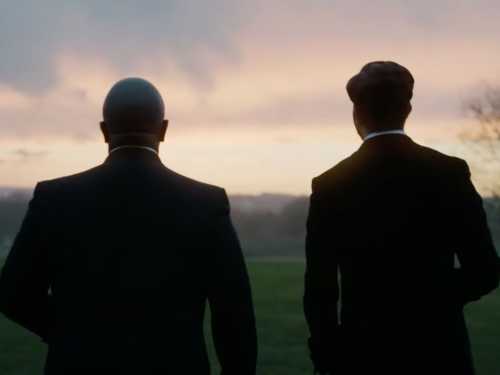
On Friday afternoon, the rapper and producer Mac Miller was found dead in his San Fernando Valley home. He was just twenty-six years old. TMZ, which has in the past decade perfected a crude art of celebrity death-chasing, broke the news; fans speculated that the artist, who spoke publicly about his struggles with addiction, had died of an accidental overdose. (A statement by Miller’s family did not name the cause of death.) In the last video that Miller shot, for “Self Care,” an existential spiral of a song from his latest album, “Swimming,” Miller is lying in his own coffin, puffing on a cigarette, carving “Memento Mori” into its wooden ceiling, seeming nonplussed by it all.
The song’s drowsy beat makes an unexpected lurch, near the end, turning from claustrophobic to weightless: Miller is now singing of “oblivion, yeah, yeah, yeah.” In the video, he bursts from his premature tomb, in a cloud of earth and dust, and floats up into the atmosphere. It’s not a force as neat or definitive as hope that is propelling Miller upward. As he evolved—and he never stopped evolving—he became a bard of post-adolescent rootlessness, comfortable in a tense, liminal space between fear and awe. “Swimming,” released in August, was a dispatch from a young man embracing his own mysteries. The album seemed to invite an eventual follow-up, a chronicling of the adrift artist reaching some shore. He was supposed to start a tour in October.
Just this past week, Miller had seemed tenderly alive. On Thursday, Vulture published a hybrid profile and interview by the music journalist Craig Jenkins. Miller discussed the HBO documentary “The Zen Diaries of Garry Shandling” (“He was always writing the words, ‘Just be Garry.’ ‘Just be Garry.’ And that shit struck a chord with me”) and the expectations placed on artists by their fans (“It’s annoying to be out and have someone come up to me and think they know. They’re like ‘Yo, man, are you okay?’ I’m like ‘Yeah, I’m fucking at the grocery store.’ ”). He also touched, indirectly, on the topic of depression. “I really wouldn’t want just happiness,” he said. “And I don’t want just sadness either.”
Earnestness marked Miller’s career from the start. Born Malcolm McCormick, he was raised in Pittsburgh by a photographer mother and an architect father. He took piano lessons, quickly taught himself the guitar and the drums, and started rapping at the age of fourteen. “I was known as being this little white kid who could rap,” Miller told The Fader, in a cover story from 2013. “When I was fifteen I used to walk my ass to East Liberty and be in ciphers with motherfuckers twice my age.” At fifteen, he formed a duo called The Ill Spoken with his friend Brian Benjamin Green, who is known as Beedie. In interviews, Miller rejected the affected ahistoricism of some of his scrappy peers and spoke rapturously of his admiration for hip-hop classicists like Big L and A Tribe Called Quest.
His early mixtapes, though charming, were insouciant and scattershot, showing few glimmers of the lyrical invention he’d develop in time. He sold music out of his trunk while still in high school. In 2010, having netted a few viral hits, he signed a four-year contract with Rostrum Records. The first mixtape released under Rostrum, “K.I.D.S.,” blew up. For his geniality, his easy commerciality, and his whiteness, Miller was swiftly labelled a “frat rapper”—an unofficial taxon used, semi-pejoratively, to describe performers deemed to be not quite stealing hip-hop from its black creators but using its essence to reflect their blithe realities. In 2011, his first studio album, “Blue Slide Park,” became the first independent album to début at No. 1 on the Billboard Hot 100 since 1995. Yet Pitchfork gave it a brutal 1.0 rating, calling it a “crushingly bland and intolerable version of Wiz Khalifa,” Miller’s fellow Pittsburgh labelmate.
The frat-rap subgenre did not endure. But Miller did, and he outgrew the juvenilia that had secured his stardom. Gradually, Miller’s technical prowess sharpened, his lyrical reserve expanded, and his producer’s touch crystallized. He got rich, grew a reddish beard, and bought a mansion in the Valley. In 2013, under the pseudonym Larry Fisherman, he produced the entirety of Vince Staples’s sublime “Stolen Youth”; his home became a hang-out spot for his generation’s most gifted rappers and musicians, from Earl Sweatshirt and Lil B to Anderson .Paak and Thundercat. (The house was also the setting for the short-lived, rambunctious reality-TV show “Mac Miller and the Most Dope Family.”) Miller, developing melodic flows and a deliberately clouded way of articulating his anguish, was earning a place among their ranks.
Miller and I are the same age. In my late teens, I blissed out to his early tapes even as I ragged on them, feeling contentedly aimless in a cramped apartment in a cold, small city. I wasn’t a part of the cult of Miller, but I accepted his ubiquity as harmless, assuming that he would come and go as quickly as the post-racial promise that briefly captivated my generation. But by the time Miller’s jazz and funk record “The Divine Feminine” was released, in 2016, I started to think that he would one day release a masterpiece. The goofy white boy had grown poetic, perhaps even a little spiritual. The heat of a revved-up creative collaborator radiated from the work. The album, about witnessing “the feminine energy of the planet,” as he once said, could have seemed like one long masculine slobber; instead, it was a sincere meditation on how romantic attraction can disable a person’s defenses. How did Miller elicit such sexual honesty from Kendrick Lamar, who usually becomes awkward on the subject, on the album’s closer, “God is Fair, Sexy Nasty?” “Hearts on my timeline / bullet to your rose,” the two croon together.
Honesty was Miller’s default. He stumbled and learned in public, even as the intensity of the public glare increased his pain. His eyebrows seemed curved in perpetual, boyish inquiry. His creative process was as depleting as it was generative; he did not always emerge whole after writing of his addiction and rehabilitations, his anxieties, his presages of death. He spoke about the perils of using music as therapy. But his frankness about his struggles could never be mistaken as glorifying them, or as resignation. Miller was working through it. “I’d rather be the corny white rapper than the drugged-out mess who can’t even get out his house,” he told The Fader, in a documentary. “Overdosing is just not cool. You don’t go down in history because you overdose. You just die.”
Thousands of tributes have been written in the wake of Miller’s death. The most desperate of our cultural platitudes about addiction and depression have been trotted out, as they were when Demi Lovato overdosed earlier this summer, when Lil Peep died late last year. We have gotten somewhat beyond decrying addiction as a moral failing. But there is still a tendency to categorize it as an individual deviance rather than a systemic failure. Miller’s ex-girlfriend, the pop star Ariana Grande, broke up with him in part because of his addiction. She has been attacked on social media in recent days for being the “reason” that Miller died. Well-meaning but hollow viral tweets exhorting us to “check on our friends” forget the shame associated with speaking up about illness, the invisibility that can accompany debilitating dependency. Certain rap forecasters have devised a terse formulation to explain the burgeoning class of “sad rappers”: the men of the nineties were rational drug dealers, they say, whereas their inheritors are weakling addicts. The hierarchy, the dog-eat-dog equilibrium that it implies, is false, and Miller, obliquely, was seeking to dismantle it.
In June of last year, on the occasion of becoming the first rapper to be inducted into the Rock and Roll Hall of Fame, Jay-Z tweeted a list of all the m.c.s, young and old, who had left a mark on him in some way. His messages were endearingly erratic, composed as if he’d hardly ever touched a keyboard: “Too many ..Fab , black people really magic . Mac Miller nice too though .” Miller had the tweet framed in his home. “Nice” embodied how associates and fans thought of him. He was known to secretly foot bills, to grant interview requests to cub reporters with fake press passes, and to generally crowd those around him with genuine concern and friendliness. This fundamental decency is one reason his premature death is so painful. But the word, as Jay-Z used it, was a different kind of appreciation. He meant that the kid was nice—deft in ways that surprised you, in ways that made you hungry to see what he’d dream up next. It is a tragedy that Miller won’t get to keep growing.
Sourse: newyorker.com






